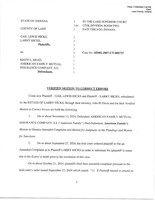The Law Office of Attorney John H. Davis Files Petition for Writ of Certiorari with United States Supreme Court Involving Bad Faith against American Family Mutual Insurance Company, S.I.
MERRILLVILLE, Ind., Oct. 22, 2022 /PRNewswire/ -- The Law Office of Attorney John H. Davis files Petition for Writ of Certiorari in United States Supreme Court. Gail Lewis Hicks and Larry Hicks vs. American Family Mutual Insurance Company, S.I.—Case number 22-287. Issues involve conflict between Petitioners—Gail Lewis Hicks and Larry Hicks ("Hickes") and Respondent—American Family Mutual Insurance Company ("American Family").
In July 2020, Hickes—as plaintiffs—filed bad faith complaint against American Family alleging Hickes are intended third-party beneficiaries pursuant to an insurance policy covering insured Keith Head whose automobile was involved in an accident where Gail Lewis Hicks was injured and she alleged insurance company—to her detriment—failed to timely and reasonably resolve said case. In trial court, American Family simultaneously filed multiple pleadings together before any rulings were issued on those pleadings thereby causing chaos and confusion.
American Family's numerous pleadings included motion for judgment on the pleadings, motion to dismiss, motion alleging improper service of complaint, and plaintiffs' failure to state claim upon which remedy can be sought. Further, American Family argued Hickes cannot sue insurance company as claimants under Keith Head's insurance policy. Responding to that argument, Hickes asserted they are not suing American Family as claimants but as third-party beneficiaries. Hickes allege American Family's filings were contradictory, conflicting, and overlapping causing substantial confusion to all involved—including trial court.
The trial court granted Hickes' judgment on the pleadings—not American Family's motion for judgment on the pleadings—and denied multiple motions filed by American Family. Interestingly, no appeal was filed by American Family based upon judgment on the pleadings granted to Hickes instead American Family filed motion for summary judgment which the trial court denied. Judgment on the pleadings for Hickes had not been vacated. Despite this, American Family filed an appeal to Indiana Appellate Court based upon trial court's denial of American Family's motion for summary judgment. During appeal, American Family did not mention there was judgment on the pleadings in favor of Hickes.
Indiana Appellate Court's ruling stated: "However, given that the only question before us on appeal is whether the trial court erroneously denied American Family's motion for summary judgment, we omit these other filings from our recitation of the procedural history as they are not relevant to the instant appeal." Despite omission, Indiana Appellate Court granted American Family's summary judgment creating two opposing judgments—as judgment on the pleadings is same as summary judgment.
Understandably, Hickes filed a petition to transfer to Indiana Supreme Court. On denying petition, Indiana Supreme Court stated it "has reviewed the decision of the Court of Appeals, and the submitted record on appeal, all briefs filed in the Court of Appeals and all materials filed in connection with the request..." Under rules, had American Family appealed judgment on the pleadings granted to Hickes that appeal would have been proper.
Indiana Appellate Court and Indiana Supreme Court have violated due process rights of Hickes under Fifth and Fourteenth Amendments of United States Constitution by failing to review all necessary relevant records and files to make a full and informed decision.
Left unchecked, this decision could be cited as precedent in some future cases.
SOURCE Attorney John H. Davis & Associates

WANT YOUR COMPANY'S NEWS FEATURED ON PRNEWSWIRE.COM?
Newsrooms &
Influencers
Digital Media
Outlets
Journalists
Opted In




Share this article